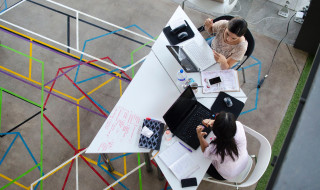Study data & learning analytics
Technology learning analytics
Combining data from different systems
Students do not learn in one environment. For a good insight into study progress, it is necessary to combine data from different systems. Think of learning management systems, student information systems and testing systems. By bringing this data together and analyzing it coherently, a more complete picture is created of, for example, the quality of the curriculum or a student's study progress. This is often not possible now.
Developing a safe and reliable infrastructure
SURF is therefore developing a safe and reliable infrastructure for learning analytics in which student privacy comes first. By managing data itself, higher education can control the ownership of the data and analyses. SURF and its members are investigating various scenarios: from fully central storage (for example at SURF) to fully decentralized storage (at the institution itself). The ability to easily link data from different systems is a prerequisite in all scenarios; therefore, exchange standards play a crucial role.
Technology exploration learning analytics infrastructure
SURF is conducting an exploration into learning analytics infrastructures and services that are currently used (inter)nationally. Together with institutions, we examine what conditions they impose on an infrastructure and investigate whether existing infrastructures meet them. Based on the technology exploration, we assess what is necessary and possible to offer an infrastructure for Dutch institutions.
Guidelines
We encourage careful handling of student data and user privacy. We formulate guidelines for an infrastructure that are based on the fundamental principles of privacy, security and important public values that we apply and test in practice. This can ultimately be used as an assessment framework for institutions in discussions with suppliers.

The opportunities of studydata are big, but what do you need to arrange technically to use learning analytics within your educational practice?